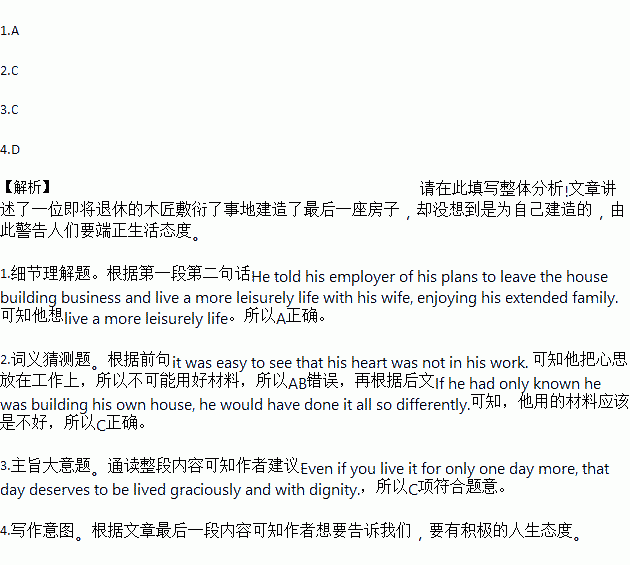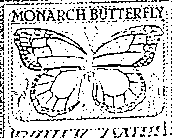题目内容
An elderly carpenter was ready to retire. He told his employer of his plans to leave the house building business and live a more leisurely life with his wife, enjoying his extended family. He would miss the pay check, but he needed to retire.
The employer was sorry to see his good worker go and asked if he could build just one more house as a personal favor. The carpenter said yes, but in time it was easy to see that his heart was not in his work. He used shoddy materials to build the house. It was an unfortunate way to end his career.
When the carpenter finished his work and the employer came to inspect the house, he handed the front-door key to the carpenter. “This is your house,” he said, “my gift to you.”
What a shock! What a shame! If he had only known he was building his own house, he would have done it all so differently. Now he had to live in a home he hadn’t built very well.
It is the same with us. We build our lives in a distracted way, reacting rather than acting, willing to put up with less than the best. At important points, we don’t give the job our best effort. Then with a shock we look at the situation we have created and find that we are now living in the house we have built. If we had realized that, we would have done it differently.
Think of yourself as the carpenter. Think about your house. Each day you hammer a nail, place a board, or erect a wall, build wisely. It is the only life you ever build. Even if you live it for only one day more, that day deserves to be lived graciously and with dignity. The plague (牌匾) on the wall says, “Life is a do-it-yourself project.”
Who could say it more clearly? Your life today is the result of your attitudes and choices in the past. Your life tomorrow will be the result of your attitudes and the choices you make today.
1.Why was the carpenter ready to retire?
A. He wanted to have a relaxed life.
B. He found a better-paid job.
C. He could still survive without working.
D. He was tired of his job.
2.What does the underlined word “shoddy” in the second paragraph probably mean?
A. Beautiful. B. Best. C. Bad. D. General.
3.What is the main idea of the fifth paragraph?
A. We should build a good house to live in.
B. We always regret what we have done.
C. We should try our best to do things well.
D. We prefer to react, rather than act.
4.What does the author mainly want to tell us in the text?
A. We should build a house wisely.
B. Life is a do-it-yourself project.
C. Building a house is like building a life.
D. We should have the right attitude towards life.
 一本好题口算题卡系列答案
一本好题口算题卡系列答案| A. | you | B. | yours | C. | yourself | D. | yourselves |


 On a recent trip to California,I stopped by Natural Bridges,where the monarch butterflies overwinter.Many years ago,I livedclose enough to it that I could walk there regularly and study their gatherings-the most memorable experiences when living in California,This visit,however,turned out to be disappointing.Though the way to the protected monarch garden looked just as I remembered it,I spotted only a few butterflies there.So I had to drive about a mile south to Lighthouse Field a more open area visited by large numbers of bikers,dog walkers and tourists.Many monarehs-at least several hundred-gathered in a small forest of pines there.Why had they moved to this less hospitable habitat-John Dayton,a biologist from San Jose provided an answer.During the 1990s,a deadly disease killed off most large pines sheltering the monarch habitats at Natural Bridges,forcing monarchs to seek shelter elsewhere.Still,since the mid-1990s,the number of overwintering monarchs in California has declined by nearly 90 percent.Butterfly populations at Santa Paula alone,for example,have dropped from about 120,000 to less than 1,000-the lowest figure in two decades.
On a recent trip to California,I stopped by Natural Bridges,where the monarch butterflies overwinter.Many years ago,I livedclose enough to it that I could walk there regularly and study their gatherings-the most memorable experiences when living in California,This visit,however,turned out to be disappointing.Though the way to the protected monarch garden looked just as I remembered it,I spotted only a few butterflies there.So I had to drive about a mile south to Lighthouse Field a more open area visited by large numbers of bikers,dog walkers and tourists.Many monarehs-at least several hundred-gathered in a small forest of pines there.Why had they moved to this less hospitable habitat-John Dayton,a biologist from San Jose provided an answer.During the 1990s,a deadly disease killed off most large pines sheltering the monarch habitats at Natural Bridges,forcing monarchs to seek shelter elsewhere.Still,since the mid-1990s,the number of overwintering monarchs in California has declined by nearly 90 percent.Butterfly populations at Santa Paula alone,for example,have dropped from about 120,000 to less than 1,000-the lowest figure in two decades.